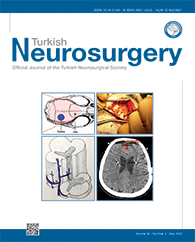2Yuzuncu Yil University, Department of Medical Pharmacology, Van, Turkey
3Van Yuzuncu Yil University, Medical Faculty, Department of Medical Biology, Van, Turkey
4Van Yuzuncu Yil University, Ozalp Vocational High School, Department of Medical Laboratory Technics, Van, Turkey
5Malatya Training and Research Hospital, Department of Anesthesia and Reanimation, Malatya, Turkey DOI : 10.5137/1019-5149.JTN.32324-20.2 AIM: To investigate the effects of midazolam (MDZ) and thiopental on neonatal and adult rat brains.
MATERIAL and METHODS: The study included adult and 7-day-old rats that were administered 9 mg/kg of MDZ, 60 mg/kg of thiopental, or both. The Bax, procaspase-3, and caspase-3 levels were assessed using Western Blot analysis and the total oxidative stress index (OSI) values were measured spectrophotometrically.
RESULTS: The procaspase-3 and caspase-3 levels were 12% and 6% lower in the neonatal MDZ group when compared to the control group. The Bax, procaspase-3, and caspase-3 levels were higher in the neonatal thiopental group by 25%, 4%, and 34%, and in the MDZ group by 16%, 19%, and 43% when compared to the neonatal control group. In the adult rats, the caspase-3 levels were 10 times higher in the MDZ group when compared to the control and thiopental groups. Moreover, the caspase-3 levels were 7 times higher in the adult thiopental group when compared to the control group. The OSI values in the neonatal rats were significantly higher in the neonatal MDZ and neonatal thiopental groups when compared to the control group (p<0.05). Similarly, the OSI values in the adult rats were significantly higher in the neonatal MDZ and neonatal thiopental groups when compared to the control group (p<0.05).
CONCLUSION: MDZ and thiopental may promote apoptosis and oxidative stress, and thereby result in neurotoxicity, with MDZ showing a greater effect in adults and thiopental showing a greater effect in neonates.
Keywords : Midazolam, Thiopental, Neurodegeneration, Oxidative stress, Neonatal rats




